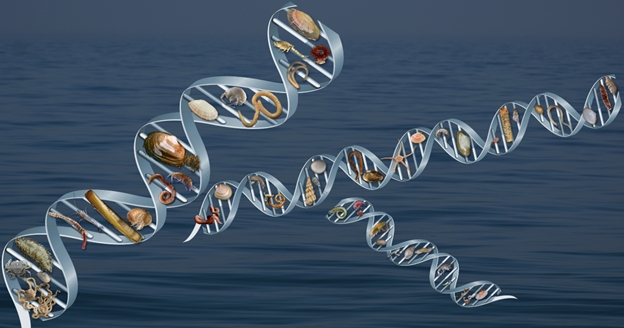26 / 04 / 2019

Illustration: GEANS
For virtually all human activities in the North Sea (aquaculture, sand extraction, dredging, marine wind farms, shipping, fishing, etc.), it is legally required to monitor the its environmental impact. Traditionally, this is done by taking samples of the seabed and identifying the bottom-dwelling organisms one by one under a microscope: a particularly labor-intensive and time-consuming process. New DNA-based techniques - the so-called metabarcoding - promise to make this monitoring much faster, cheaper and more accurate. However, before these techniques can be implemented in current monitoring programs, the GEANS project still has to remove some obstacles.
In the forthcoming three years, nine partners from Belgium, the Netherlands, Great Britain, Germany, Denmark, Sweden and Norway will develop so-called DNA barcodes for several hundreds of seabed animals (worms, amphipods, molluscs, brittle stars, etc.). Once in the digital open source DNA library, the presence of the relevant species can automatically be detected by a machine from a seawater or seabed sample.
Six pilot studies – involving companies, policymakers and other stakeholders – will implement the DNA-based techniques alongside traditional identification techniques. The pilots are, for example, impact studies on aquaculture, sand extraction, non-native species or monitoring programs within the framework of the European Natura 2000 directives and the Marine Strategy Framework Directive.
The project was officially kicked off in Ostend on 15 March. Flemish partners are ILVO and the Flanders Marine Institute. ILVO coordinates the project, takes the lead in the pilot study on sand extraction, contributes to the DNA library and the policy framework. VLIZ is responsible for the international contacts and data management, and will contribute to protocol development, pilot studies, product development and training. Read the full press release on the occasion of the kick-off meeting on the GEANS website.
GEANS – Genetic tools for Ecosystem health Assessment in the North Sea region
Financed by: Interreg Noordzee
Duration of the project: 3 years
Total budget: 2.45 milion Euro
Website: https://northsearegion.eu/geans
Partners:
- Flanders research institute for agriculture, fisheries and food (ILVO), Belgium
- Flanders Marine Institute (VLIZ), Belgium
- SeAnalytics AB, Sweden
- Nord University, Norway
- The Centre for the Environment Fisheries and Aquaculture Science (Cefas), United Kingdom
- Aarhus University - Det. of Geoscience, Germany
- Wageningen University, dept. of Animal Science, The Netherlands
- Senckenberg Gesellschaft für Naturforschung, Denemark
- Naturalis Biodiversity Centre (NBC), The Netherlands
- Klaas Deneudt (klaas.deneudt@vliz.be | +32-(0)479-66 02 76)
- Pascal Hablützel (pascal.hablutzel@vliz.be | +32-(0)59-34 14 16)
